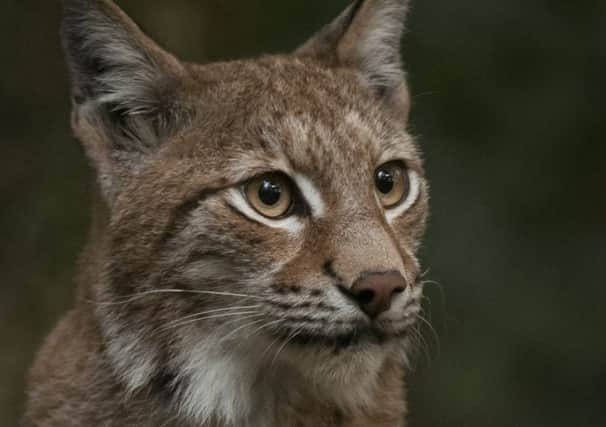Farmers welcome rejection of plans to let lynx loose next to Borders


The Lynx UK Trust had proposed releasing six of the wildcats in Kielder Forest as a trial project, but that bid has been turned down by UK Government environment secretary Michael Gove, acting on advice from Natural England.
If approved, the trust’s plans would have seen lynx roaming free in the UK for the first time in over 1,300 years.
Advertisement
Hide AdAdvertisement
Hide AdAccording to research cited by the trust, a lynx in the wild would be likely to kill only one sheep every two years or so, but farmers’ representatives dispute that claim, saying the probable death toll would be far higher.
A study trip to Norway indicated that the six Eurasian lynx proposed for release at Kielder would be expected to claim the lives of 60 sheep a year in the Borders and Northumberland, rather than the three or so suggested by the trust.
In a letter to trust boss Paul O’Donoghue, Mr Gove says: “Following a thorough assessment, Natural England concluded that the application does not meet the necessary standards set out in International Union for Conservation of Nature guidelines and fails to give confidence that the project could be completed in practical terms or that the outputs would meet the stated aims.
“As a result, Natural England found that the proposal lacked the necessary depth and rigour to provide confidence it would succeed.
Advertisement
Hide AdAdvertisement
Hide Ad“It had particular concerns in a number of areas – firstly with regard to overall feasibility, and it found that the project lacked organisational resilience and did not sufficiently evidence a securely-held budget.
“It was not clear how this proposal would be funded, including how an exit strategy would be executed in an appropriate manner.
“It also had concerns about reliance on volunteers and insufficient project team contingency, as well as the lack of formal partnerships or collaborations with other relevant organisations that would normally be expected.
“Significantly, the proposal did not include an ecological impact assessment and therefore the application lacked assurances that impacts had been considered or that the area had been properly assessed as suitable for lynx.
Advertisement
Hide AdAdvertisement
Hide Ad“As far as could be seen, major landowners and managers, including Forestry Commission England, were either engaged insufficiently or not at all.
“As key enablers of the project, this is concerning as their support would have provided reassurance about its potential success.
“In addition, the proposal did not demonstrate sufficient local support for the project and the socio-economic benefits of the trial were unclear.
“The lack of demonstrated local buy-in also fails to show how the risk of persecution of animals had been managed down to an acceptable level.
Advertisement
Hide AdAdvertisement
Hide Ad“It was not clear how the trial would provide evidence to enable a decision on a full reintroduction as there was no coherent plan in place for monitoring lynx or impacts on other species, habitats or humans.”
Scottish Government rural economy secretary Fergus Ewing had vowed that he would never support the reintroduction of lynx, extinct in Britain since the seventh century or thereabouts, and farmers’ representatives and Ettrick, Roxburgh and Berwickshire MSP Rachael Hamilton were also opposed to the plans.
Mrs Hamilton said: “I am glad that a strong, evidence-based approach has resulted in this decision.
“The reintroduction of lynx in Kielder Forest could have been disastrous for many Borders farmers rightly worried about their livestock.
Advertisement
Hide AdAdvertisement
Hide Ad“The lack of sound evidence and a weak implementation plan mean this application was not robust enough to stand up to scrutiny.
“Ultimately, it is a victory for common sense”
National Sheep Association chief executive Phil Stocker added: “We are delighted to hear the application has been rejected and that Mr Gove and his colleagues have taken our comments on board.
“We strongly believe this is the right decision, on ecological, social and agricultural grounds.
“The threat of the lynx against sheep was very real, and we could not be happier that this isn’t a risk our members will have to face.”
Advertisement
Hide AdAdvertisement
Hide AdNational Farmers’ Union Scotland’s environment and land use policy manager, Andrew Midgley, said: “The decision not to release Lynx into Kielder Forest will come as a great relief to our members in the Borders, particularly sheep farmers who had serious concerns over the health and safety of their livestock had these plans been given the green light.
“It is clear from the secretary of state’s letter that there was insufficient, if any, engagement with farmers, landowners and the wider community and that the concerns of farmers were not meaningfully addressed.
“This project was flawed from the beginning and NFU Scotland is delighted it will not be going ahead.”
Ross McAulay, 28, whose family’s 550-acre farm at Wauchope, near Bonchester Bridge, borders the forest, previously warned the plans could be “catastrophic for sheep farming in the Borders.”
Advertisement
Hide AdAdvertisement
Hide AdThis week he said the news comes as a “welcome relief” to his family – parents Alistair and Anne and sister Jen – who tend to a flock of more than 600 Scots mules and Cheviots.
“Common sense has provailed,” he said. “The news has come as a welcome relief.
“The National Sheep Association and National Farmers’ Union sum it up pretty well how we are feeling.”
Neighbour Andrew Douglas, whose 4,000-acre farm at Saughtree is separated from Kielder Forest by only a dyke, previously claimed that Lynx UK Trust had shown a lack of respect towards farmers.
Advertisement
Hide AdAdvertisement
Hide AdMr Douglas, 68, added: “I think Natural England has now obviously come to the right conclusion, the conclusion that most of us thought they would come to.
“Michael Gove has obviously accepted that.
“Anyone with any sense could see that O’Donoghue was talking nonsense, but this decision is a big relief for all concerned.”